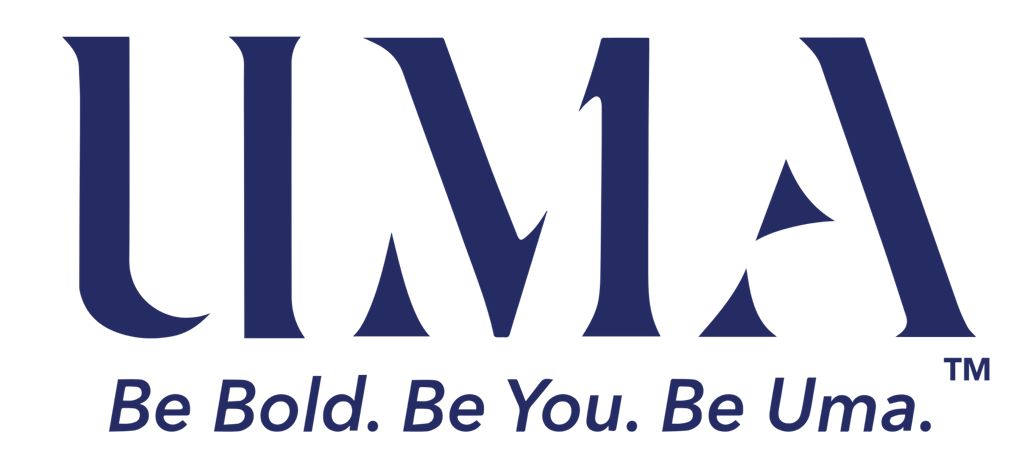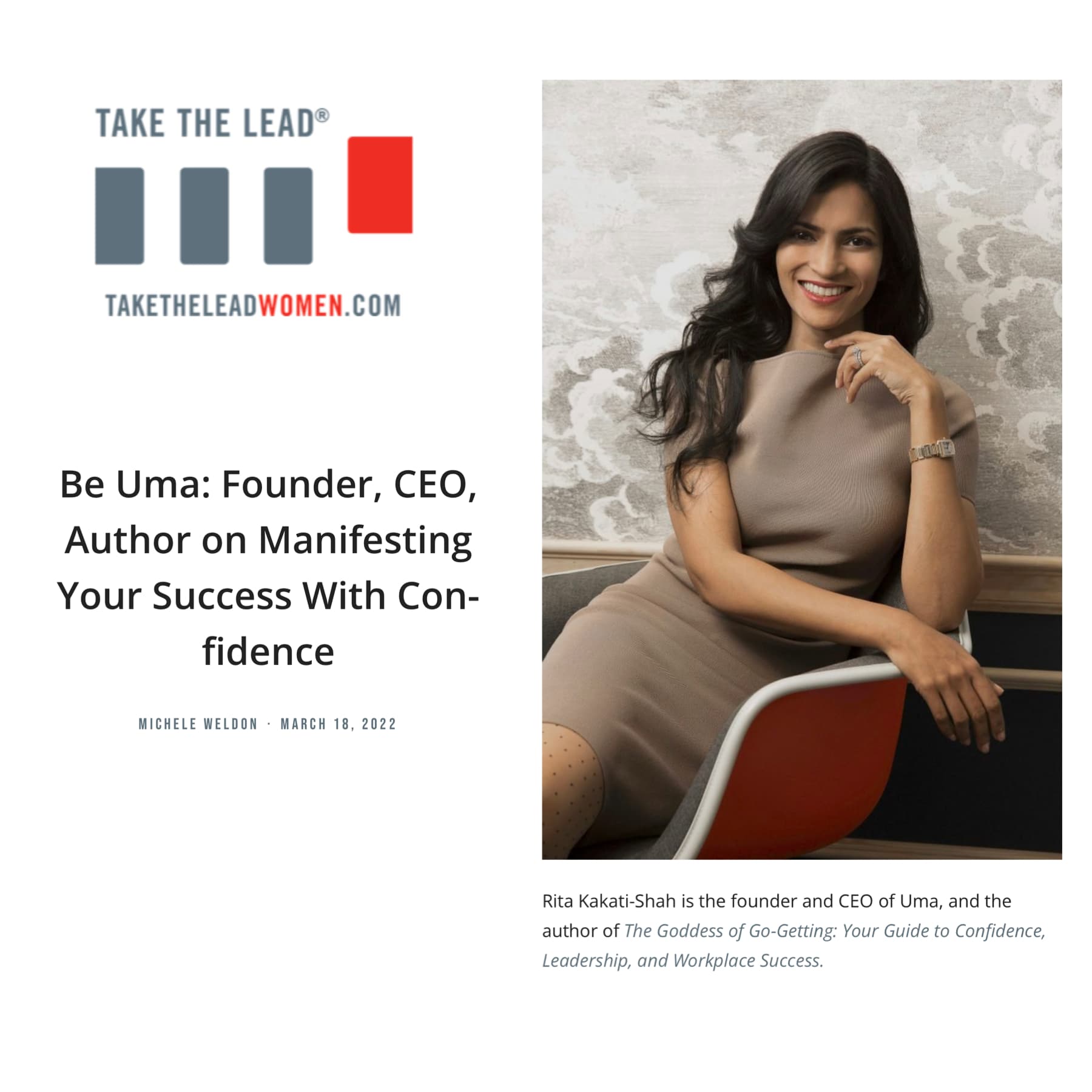Shared from Take the Lead, written by Michele Weldon. Original article here.
She has always liked moving fast.
At seven years old, growing up in greater London, Rita Kakati-Shah told her physician father and zoologist mother (who was also a classically trained singer and dancer) that she intended to be a formula race car mechanic or race car driver.
@RitaKakatiShah is the founder and CEO of Uma, and the author of The Goddess of Go-Getting: Your Guide to Confidence, Leadership, and Workplace Success. #womenleaders
“They didn’t take me seriously,” says Kakati-Shah, Founder and CEO of Uma, an international platform for women and minorities in leadership and author of the new book, The Goddess of Go-Getting: Your Guide to Confidence, Leadership, and Workplace Success.
Abandoning car racing as a potential future career, soon enough she decided to follow in her father’s footsteps to become a doctor.
In the U.K., Kakati-Shah says it is the norm to decide what you want to do with your life professionally by the age of 16. She dutifully attended the Royal London and St. Bartholomew’s School of Medicine and Dentistry from 1996 to 1998, but it was not her passion. Though she says she was a star pupil and her parents and advisors encouraged her to continue, she says she did not enjoy it and skipped her anatomy classes.
“I couldn’t stand it,” she says, so she switched to Kings College London to study business. ”I could have carried on, but I am a courageous thinker,” says Kakati-Shah, who went on to become a three-time Stevie Awards for Women in Business winner and a celebrated alum serving on the Advisory Council of King’s Business School.
“Dad took it hard; he was heartbroken and didn’t understand because I come from a long line of doctors in the family,” she says.
But each person needs to follow their purpose, she says. “You’ve got to follow the rules of the playground.” But you also have to respond to problems and situations respecting your individuality, valuing your own intentions and aligning with your authenticity.
“You’ve got to follow the rules of the playground,” says @RitaKakatiShah. But you also have to respond to problems and situations respecting your individuality, valuing your own intentions and aligning with your #authenticity.
“It’s OK not to know what you want to do” at first, Kakati-Shah says. “When you talk about careers, there isn’t a career for life. Career suggests longevity.”
A narrow and singular approach to work steeped in gender bias is not helpful or realistic. The art and practice of maneuvering and creating one’s own path informs Kakati-Shah’s work as a coach and mentor to business leaders, veterans, survivors of domestic violence, women in technology/STEM and students through Uma.
A narrow and singular approach to work steeped in #genderbias is not helpful or realistic. The art and practice of maneuvering and creating one’s own path informs @RitaKakatiShah’s work as a coach and mentor.
In addition to writing her latest book, she also serves as an advisor, ambassador, and diversity and inclusion expert to multiple boards and global organizations such as the Jewish Community Center of Manhattan, Women Veterans’ Founding Circle of the ACP, the New York City Bar Association, Turning Rock Partners, St. George’s Society of New York, Democracy Without Borders in India, and also Equality Starts at Home, Ormiston Park Academy, and the London Bihu Committee in the UK.
Back in 1998, switching to business management at Kings College was energizing and enlightening. “I loved it, it was where my heart was,” Kakati-Shah says.
Before graduating, she attended a career fair with a friend where Kakati-Shah was waiting outside for her on a bench. Kakati-Shah says she began chatting with a woman who unbeknownst to her was the global head of Human Resources at Goldman Sachs.
Many, many interviews later—for five different divisions—Kakati-Shah began working in the equities division of Goldman Sachs in 2000, following a year of training.
“I spent 10 years there,” she says, and was one of very few women in the division. She got very involved in networking with affinity groups and “DEI before it was a thing,” and was awarded the prestigious Excellence in Citizenship and Diversity Award at Goldman Sachs.
With a decade at Goldman Sachs on her resume, a family friend approached her about an opportunity in business development for a medical company launching clinical trials in the U.S. and elsewhere globally. She jumped in.
“I loved it,” Kakati-Shah says. It was a new company and so different from the enormous global infrastructure at Goldman Sachs, she says. Traveling to the U.S. often, she moved to New York in 2011, where she met her now husband. In 2013 their son was born.
“I took four years off, and of all the jobs I have ever done, the most challenging was as a full-time mom,” says Kakati-Shah, whose daughter was born in 2016.
It was the world’s stereotyped and binary language around her choice that was unsettling. She encountered dismissiveness and bias.
Others concur this is a problem. “Long periods of unemployment can make it harder to find jobs due to the negative stigma some employers associate with gaps in employment. Upon finding a job, these workers may not earn as much as they once did,” Emily Martin, vice president for education and workplace justice at National Women’s Law Center tells SHRM.
That needs to change, Kakati-Shah says. “You do not call it a career break, you call it a career transition,” she says. Parenthood offered her the opportunity to build communication skills of empathy, listening and observing.
“This is totally transferrable to the paid workforce,” says Kakati-Shah, who is an honoree of the President’s Lifetime Achievement Award from President Joe Biden. “If you can negotiate with a toddler, you can take that skill to a meeting.”
“[Parenthood] is totally transferrable to the paid workforce,” says @RitaKakatiShah, who is an honoree of the President’s Lifetime Achievement Award from President @JoeBiden. “If you can negotiate with a toddler, you can take that skill to a meeting.” #parenthood
Just as what prompted her move to Goldman Sachs, and then the move to business development in clinical trials, another serendipitous encounter with someone at a women’s networking event in New York prompted her to found Uma in 2016. Her organization is named after “one of the principal Hindu goddesses, the goddess of power, motherhood, nourishment, love and harmony.”
When she arrived at the networking event, Kakati-Shah says she wrote on her nametag that her job title was “SAHM,” for Stay At Home Mother. When another attendee asked her what it meant, that woman ended the conversation and walked away. Kakati-Shah then later tapped her on the shoulder to explain her experience in Goldman Sachs with equities and also her experience in medical clinical trials. They became friends.
With her insight and knowledge as a parent, Kakati-Shah created Uma with the vision of working with women and minorities around the world to manifest their own successful journeys of entrepreneurship and transitioning careers.
With her insight and knowledge as a parent, @RitaKakatiShah created Uma with the vision of #working with #women and minorities around the world to manifest their own successful journeys of #entrepreneurship and transitioning careers.
This is urgent now more than ever, as the COVID pandemic recently hit its two-year mark.
The National Women’s Law Center reports that from January 2020 to February 2022, Bureau of Labor Statistics data shows “1.1 million women left the labor force during that span, accounting for 63 percent of all jobs lost, according to SHRM. “While women gained 188,000 jobs in January 2022, they are still short by more than 1.8 million jobs lost since February 2020.”
“While men have recouped lost jobs, women are still in a big hole, and that shows how the pandemic impacts genders in different ways,” Martin tells SHRM. “Part of the reason for this is because women still hold the lion’s share of caregiver responsibilities.”
Kakati-Shah knows this very well and is writing, speaking and advocating for a major shift not just in the workplace, but in homes, communities and the wider culture.
“This is about changing perceptions,” says Kakati-Shah. “Companies have a different viewpoint. If they saw a career break for parenthood, you are 50% less likely to be hired.”
Axios reports that COVID has led to an increase in calls of bias to the Equal Employment Opportunity Commission. “Discrimination against mothers and other caregivers was already a problem heading into the pandemic, but it worsened as pressures on parents — or anyone taking care of someone vulnerable — intensified during COVID-19, with schools, daycares and other resources shuttered or intermittently unavailable.”
This discrimination has different forms, Axios reports. The EEOC offers examples in its guidance of what to avoid to businesses and management in leadership: “Not assigning demanding or high-profile projects because of stereotypes about a mother’s willingness to work. Disparaging women for working hard when they ‘should’ be home with their kids. Or, denying fathers the opportunity to work remotely while letting women do so, because of stereotypes about men not being primary caregivers.”
Discrimination also shows up in the historic and ongoing gender pay gap.
The Institute for Women’s Policy Research shows that in 2021, “women earned just 83.1 percent of what men earned for full-time work, but when women and men working both part- and full-time are included, women made only 77.3 cents for every dollar a man made in 2021.”
IWPR reports, “The pay gaps differ for those identifying as women. Hispanic women’s full-time earnings were just 58.4 percent compared to white men’s earnings, while Black women’s was 63.1 percent, and white women’s 79.6 percent. The report states that women’s full-time earnings are less than men’s in almost all of the top 20 most common occupations for women and all of the top 20 most common occupations for men.”
That blind sightedness across systems resulting in these pay and opportunity gaps is changing. In part due to the pandemic creating the Great Resignation, it is also creating a reckoning in remote work, flexibility and diversity, equity and inclusion initiatives. Efforts to change the perceptions are urgently needed. This is what Uma is all about, Kakati-Shah says.
In part due to the #pandemic creating the #GreatResignation, it is also creating a reckoning in #remotework, flexibility and diversity, equity and inclusion initiatives.
“We believe in change. We are unafraid to question the masses and make bold suggestions. We aim to change the status quo for gender and race equality, in the workplace, society and beyond,” the Uma website states.
Due to the pandemic shifting of workplace boundaries and more remote work connections globally, attitudes are changing. “There is more of a cultural understanding of others,” Kakati-Shah says. “Offices are getting to see the gaps in terms of workload. We have to take ownership to change the narrative.”
Kakati-Shah is doing her part. In addition to her latest book (she has co-authored two earlier books), she hosts the popular South Asian television show, “The Uma Show” on Mana TV International and has spoken around the world to multinational corporations and global policy forums such as UNESCO, European Parliament in New York, Delhi, London, Madrid, San Francisco, Shillong, Sochi, Toronto and Zambia.
“We believe in change. We are unafraid to question the masses and make bold suggestions. We aim to change the status quo for #gender and race #equality, in the workplace, society and beyond,” the Uma website states.
“Uma is the goddess of go-getting,” says Kakati-Shah. “She is mother, daughter, sister, wife. She depicts all the roles women play in their lives. She is strong, determined, full of courage and confidence. She is inside of you.”
She adds quickly with the speed of a race car driver, “Be bold. Be you. Be Uma.”

